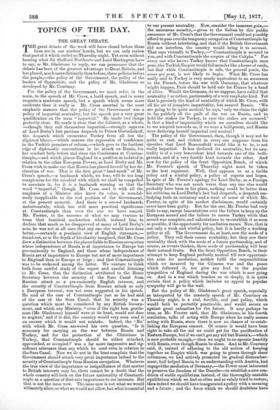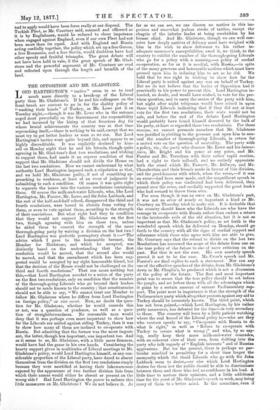TOPICS OF THE DAY.
THE GREAT DEBATE.
THE great debate of the week will have closed before these lines are in our readers' hands, but we can only review that part of it which ended on Thursday night. Yet even without hearing what Sir Stafford Northcote and Lord Hartington have to say, or Mr. Gladstone to reply, we can pronounce that the debate has been of the greatest advantage to Great Britain, and has placed, much more distinctly than before, three policies before the people,—the policy of the Government, the policy of the leaders of Opposition, and the policy of Mr. Gladstone as developed by Mr. Courtney.
For the policy of the Government, we must refer, in the main, to the speech of Mr. Cross, a lucid speech, and in many respects a moderate speech, but a speech which seems more moderate than it really is. Mr. Cross asserted in the most emphatic manner that the policy of the Government was a policy of impartial neutrality, but his speech put a very great qualification on the term " impartial." Ho made two things perfectly clear. He made it clear that the Cabinet, as a whole, —though they call themselves impartial,—strongly approve of Lord Derby's last partisan despatch to Prince Gortschakoff, the despatch which exonerates Turkey from all but the slightest blame,—which renews the expression of confidence in the Turkish promises of reform,—which goes to the furthest edge of diplomatic conventions in its attack on Russia, for her conduct both before and since the Conference at Constan- tinople,—and which places England in a position as isolated in relation to the other European Powers, as Lord Derby and Mr. Cross wish to make out that Russia has placed herself by her de- claration of war. That is the first great " land-mark " of Mr. Cross's speech,—a landmark which, we fear, will be too long conspicuous for the mischief with which we shall be compelled to associate it, for it is a landmark warning us that the word " impartial," though Mr. Cross used it with all the emphasis of a Minister who knew its value, is scandal- ously inapplicable to the real position of the Government, at the present moment. And there is a second landmark, unfortunately, which has still more practical significance at Constantinople than even the one we have named. Mr. Forster, in the excesses of what we may venture to term that fanatical moderation which induced him to declare that much as he disapproved of many of Lord Derby's acts, he was not at all sure that any one else would have done better,—certainly a pessimist view of English statesmen,— found out, or in the depth of his charity imagined, that Mr. Cross drew a distinction between the places liable to Russian occupation whose independence of Russia is of importance to Europe but pre-eminently to England, and those whose independence of Russia are of importance to Europe but not of more importance to England than to Europe at large ; and that Constantinople was to be reckoned among the latter. We venture to think both from careful study of the report and careful listening to Mr. Cross, that the distinction attributed to the Home Secretary between the security of the Suez Canal from Russian attack as a pre-eminently English interest, and the security of Constantinople from Russian attack as only a. European interest, was not even suggested in his speech. He said of the case of Constantinople just as he had said of the case of the Suez Canal, that its security was a question which must be considered by any British Govern- ment, and which any Ministry, " even if the right hon. gentle- man (Mr. Gladstone) himself were at its head, would not dare to neglect," and if it did, the country would very soon send it an answer which it would not mistake. Indeed, the ' No' with which Mr. Cross answered his own question, ' Is it necessary for carrying on the war between Russia and Turkey, and for the protection of the Christians in Turkey, that Constantinople should be either attacked, approached, or occupied I' was a far more impressive and sig- nificant utterance than any which he used even in relation to the Suez Canal. Now we do not in the least complain that the Government should attach very great importance indeed to the security of Constantinople from Russian occupation. Whatever the true view of the importance or insignificance of that matter to British interests may be, there cannot be a doubt that the whole country will look on the future nationality of Constanti- nople as a question of first-rate importance to our interests. But that is not the issue now. The issue now is not what we would ultimately allow, or what we would not allow, but what is essential to our present neutrality. Now, consider the immense gain,— the enormous security,—given to the Sultan by this public_ assurance of Mr. Cross's that the Government could not-possibly afford to pass over the temporary occupation of Constantinople by Russia without interfering, and that if the British Government did not interfere, the country would bring it to account. That says virtually to Turkey,—" Constantinople is secured to you, and with Constantinople the sceptre of the Caliphs." For every one who knows Turkey knows that Constantinople once gone, the Turkish Empire would fall asunder like a house of cards,. but that while Constantinople is safe, the general panic, the sauve qui peat, is not likely to begin. What Mr. Cross has really said to Turkey is very nearly equivalent to an assurance to the French, before the war with Germany, that whatever might happen, Paris should be held safe for France by a band of allies. Would the Germans, do we suppose, have called that neutrality ? or rather, partizanship of a very emphatic kind. Yet that is precisely the kind of neutrality of which Mr. Cross, with all his air of complete impartiality, has assured Russia. ' We are going to be quite neutral,' he says,' only we claim the right to lay publicly all the guilt of the war on Russia, and to hold the stakes for Turkey, in case the stakes are menaced; Is that a kind of impartiality which we ourselves should like to see adopted towards us, if we were a belligerent, and Russia were declaring herself impartial and neutral ?
The policy of the Government, then, though it may not be quite so rash and violent as every one supposes from his speeches that Lord Beaconsfield would like it to be, is not really impartial. It has declared its neutrality, but its neu- trality is of a very benevolent kind towards one of the belli- gerents, and of a very hostile kind towards the other. And now for the policy of the front Opposition Bench, of which Mr. Forster's speech of Thursday night must be taken as the best exponent. Well, that appears to us a feeble- policy and a wistful policy, a policy of regrets and hopes. In spite of Mr. Forster's apology for Lord Derby, as a Foreign Secretary who was not much worse than any one else would. probably have been in his place, nothing could be better than his criticism on Lord Derby's last bad despatch, a despatch em- bodying both an acrimony and a want of sense of which Mr. Forster, in spite of his modest disclaimers, would certainly never have been guilty. But for the rest, Mr. Forster had very little to say, except lamentations over the failure to keep up the European accord and the failure to coerce Turkey while that accord was complete, and exhortations to re-establish it as soon as possible, if the opportunity for mediation recurs. Now, that is not only a weak and wistful policy, but it is hardly a working policy at all. The Government do, at least, sow the seeds of a policy. They call their course neutrality, but they sow their neutrality thick with the seeds of a future partisanship, and of course, as events thicken, these seeds of partisanship will bear their natural fruits. But the front Opposition Bench, in their attempt to keep England perfectly neutral till new opportuni- ties arise for mediation, neither fulfil the responsibilities. which we incurred by the Crimean war and the peace which followed it, nor give any lead to the popular sympathies of England during the war which is now going on. And in a war which touches us so deeply, it is quite certain that a policy which includes no appeal to popular sympathy will go to the wall.
But the policy of Mr. Gladstone's great speech, especially- as interpreted by the masterly speech of Mr. Courtney on Thursday night, is a real, forcible, and just policy, which would both be perfectly practicable, and would secure us against great calamities for the future. It may perhaps be true, as Mr. Forster said, that Mr. Gladstone, in his fourth resolution, talks of acting with Europe when he really means. acting with Russia, since there is now no chance of re-estab- lishing the European concert. Of course it would have been right to take all the aid we could get for the pacification of Eastern Europe, but if we can't get any aid but Russia's,—which is now probable enough,—then we ought to co-operate heartily with Russia, even though Russia be alone. And as Mr. Courtney said, if, instead of adhering to the old notion of keeping together an Empire which was going to pieces through sheer rottenness, we had actively promoted its gradual dismember- ment, had helped Russia to an understanding with Austria, had engaged the mediation of Germany,—the Power most interested to preserve the freedom of the Danube—to establish a new con- dition of stable equilibrium instead, of the thoroughly unstable equilibrium which we had so often and so vainly tried to restore, then indeed we should have inaugurated a policy with a meaning and a future ; and the force which we should doubtless have
had to apply would have been force really at our disposaL The Turkish Fleet, as Mr. Courtney said, manned and officered as it is by Englishmen, would be reduced to sheer impotence when engaged against England, even if our own Fleet had not been more than its equal. And with England and Russia acting cordially together, the policy which set up a free Greece, a free Roumania, and a free Servia, would doubtless have had other speedy and fruitful triumphs. The great debate will not have been held in vain, if the great speech of Mr. Glad- stone and the powerful argument of Mr. Courtney are read and reflected upon through the length and breadth of the land.



































 Previous page
Previous page